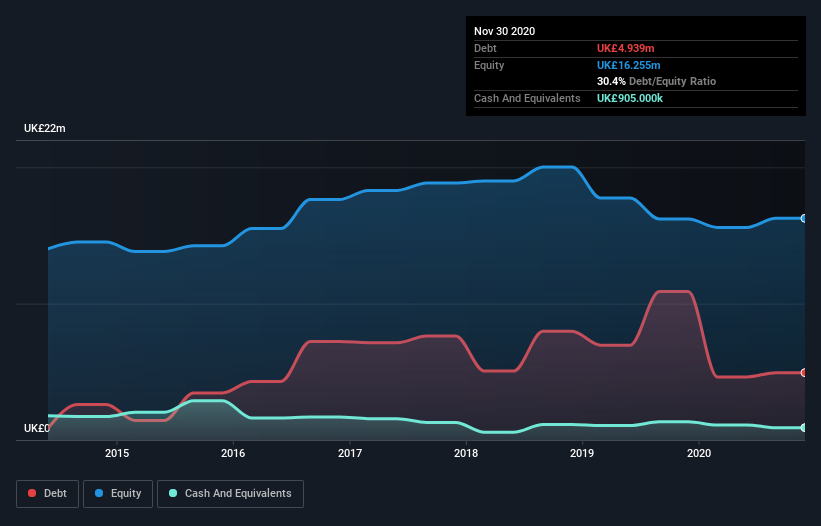The external fund manager backed by Berkshire Hathaway's Charlie Munger, Li Lu, makes no bones about it when he says 'The biggest investment risk is not the volatility of prices, but whether you will suffer a permanent loss of capital.' So it might be obvious that you need to consider debt, when you think about how risky any given stock is, because too much debt can sink a company. As with many other companies Leeds Group plc (LON:LDSG) makes use of debt. But the real question is whether this debt is making the company risky.
What Risk Does Debt Bring?
Generally speaking, debt only becomes a real problem when a company can't easily pay it off, either by raising capital or with its own cash flow. In the worst case scenario, a company can go bankrupt if it cannot pay its creditors. However, a more common (but still painful) scenario is that it has to raise new equity capital at a low price, thus permanently diluting shareholders. Having said that, the most common situation is where a company manages its debt reasonably well - and to its own advantage. When we examine debt levels, we first consider both cash and debt levels, together.
See our latest analysis for Leeds Group
What Is Leeds Group's Debt?
The image below, which you can click on for greater detail, shows that Leeds Group had debt of UK£4.94m at the end of November 2020, a reduction from UK£10.9m over a year. However, because it has a cash reserve of UK£905.0k, its net debt is less, at about UK£4.03m.

How Strong Is Leeds Group's Balance Sheet?
The latest balance sheet data shows that Leeds Group had liabilities of UK£6.75m due within a year, and liabilities of UK£2.83m falling due after that. On the other hand, it had cash of UK£905.0k and UK£3.94m worth of receivables due within a year. So it has liabilities totalling UK£4.73m more than its cash and near-term receivables, combined.
This is a mountain of leverage relative to its market capitalization of UK£7.10m. Should its lenders demand that it shore up the balance sheet, shareholders would likely face severe dilution. When analysing debt levels, the balance sheet is the obvious place to start. But it is Leeds Group's earnings that will influence how the balance sheet holds up in the future. So if you're keen to discover more about its earnings, it might be worth checking out this graph of its long term earnings trend.
In the last year Leeds Group had a loss before interest and tax, and actually shrunk its revenue by 2.1%, to UK£36m. We would much prefer see growth.
Caveat Emptor
Over the last twelve months Leeds Group produced an earnings before interest and tax (EBIT) loss. Indeed, it lost UK£165k at the EBIT level. When we look at that and recall the liabilities on its balance sheet, relative to cash, it seems unwise to us for the company to have any debt. So we think its balance sheet is a little strained, though not beyond repair. For example, we would not want to see a repeat of last year's loss of UK£575k. In the meantime, we consider the stock very risky. When analysing debt levels, the balance sheet is the obvious place to start. However, not all investment risk resides within the balance sheet - far from it. For example, we've discovered 2 warning signs for Leeds Group (1 is a bit unpleasant!) that you should be aware of before investing here.
If, after all that, you're more interested in a fast growing company with a rock-solid balance sheet, then check out our list of net cash growth stocks without delay.
If you’re looking to trade Leeds Group, open an account with the lowest-cost* platform trusted by professionals, Interactive Brokers. Their clients from over 200 countries and territories trade stocks, options, futures, forex, bonds and funds worldwide from a single integrated account. Promoted
New: AI Stock Screener & Alerts
Our new AI Stock Screener scans the market every day to uncover opportunities.
• Dividend Powerhouses (3%+ Yield)
• Undervalued Small Caps with Insider Buying
• High growth Tech and AI Companies
Or build your own from over 50 metrics.
This article by Simply Wall St is general in nature. It does not constitute a recommendation to buy or sell any stock, and does not take account of your objectives, or your financial situation. We aim to bring you long-term focused analysis driven by fundamental data. Note that our analysis may not factor in the latest price-sensitive company announcements or qualitative material. Simply Wall St has no position in any stocks mentioned.
*Interactive Brokers Rated Lowest Cost Broker by StockBrokers.com Annual Online Review 2020
Have feedback on this article? Concerned about the content? Get in touch with us directly. Alternatively, email editorial-team (at) simplywallst.com.
About AIM:LDSG
Leeds Group
Engages in the property investment activities in the United Kingdom.
Moderate with mediocre balance sheet.
Market Insights
Community Narratives



